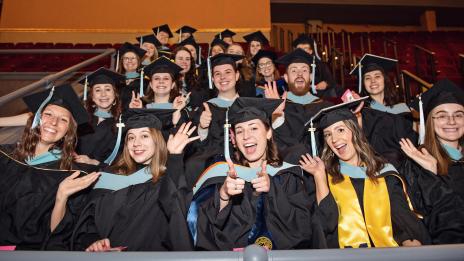By Madeline Swanson | Art by Kara Fields
The University of Michigan School of Education (SOE) celebrated its centennial in 2021, during the height of the COVID-19 pandemic. This inauspicious start to their second century saw unprecedented challenges for the education system. Staffing shortages and schools closing nationwide upended learning environments as a shifting educational landscape unfolded before them.
Despite the problems facing the profession, Elizabeth Birr Moje, SOE dean, George Herbert Mead Collegiate Professor of Education, and Arthur F. Thurnau Professor, believes that out of this turbulence and disruption can come transformative educational opportunities. And transforming the landscape is exactly what she and the school are setting out to do.
“So much of what we do in education is taken for granted. We engage in practices simply because they’ve always been a certain way,” Moje said. “That’s why we have to disrupt the norms and challenge people’s perceptions before we can reshape them. And when we attempt to reshape perceptions, we have to study the effects and document the research. No one can do that better than our School of Education faculty, staff, and students.”
By establishing robust partnerships, improving opportunities to learn, supporting future educators, and elevating education as a social justice enterprise, Moje believes that SOE can prepare students and future educators for an ever-changing learning environment.
“You often have to disrupt before you can transform. And it’s largely because so much of what we do in education, or really just in society, is taken for granted.” – Dean Moje
Disrupting the landscape
The P-20 partnership
In 2018, U‑M SOE partnered with the Detroit Public Schools Community District, Starfish Family Services, Marygrove Conservancy, and The Kresge Foundation to launch the P-20 (preschool through higher education) partnership—a cradle-to-career educational campus at the former Marygrove College in northwest Detroit. Moje said the partnership has two purposes: The first is to educate children, youth, and adults in the northwest Detroit area. The second is to provide a proof of concept of what can happen when community partners work together to provide “superior educational experiences” and then evaluate the results in a way that holds the people designing these experiences accountable for the work.
“The argument that we’re making is that a university can use its academic and research mission in the service of real people, in real time, while also producing knowledge about the impact of that work,” Moje said.
One of the first of its kind in the country, the P-20 partnership includes a prenatal-to-age-five education center called the Marygrove Early Education Center and a K-12 public school named The School at Marygrove (TSM). TSM staff and leaders partner with U‑M SOE faculty, staff, and students to develop project- and place-based, holistic educational experiences, which connect students’ academic learning with broader community learning opportunities.
Another highlight is an extended teacher training program, designed to tackle one of the profession’s greatest challenges: teacher shortages and retention. U‑M SOE students have the opportunity to pursue an internship through the Michigan Education Teaching School at Marygrove for their entire program of teacher education and learn under the tutelage of expert mentor teachers, together with U‑M SOE teacher educators. They can then enter the residency program, where newly certified teachers are supported by experienced teachers and SOE faculty and staff for three additional years, at no cost to the novice teacher. In addition to serving as certified members of the school’s teaching staff, the residents also serve as near-peer mentors to SOE interns pursuing their degrees.
“This kind of support promises to increase the efficacy of novice teachers,” Moje said. “And we hope to keep them in the profession. So when they finish residency, the idea is that they will go to other Detroit schools.”
A LEAP into the future
These innovations and others would not be possible without the support of donors like Roger (BBA ’87) and Carin Levine Ehrenberg (AB ’88), among others. Carin Levine Ehrenberg said they were inspired to support Moje’s vision and the innovative partnerships and programs underway—especially The School at Marygrove. In addition, leadership gifts from Regina (AB Ed ’73, Cert ’73) and Ronald McNeil and Wally Prechter (AB Ed ’79) have aided in launching the work of The School at Marygrove and the P-20 partnership.
“We loved the idea of a STEM and social justice-based curriculum and the active learning approach that would begin in preschool and continue through high school,” Levine Ehrenberg said.
After meeting Moje and hearing more about the Marygrove campus, the Ehrenbergs learned of an effort to develop a new program at Marygrove that would immerse undergraduates in the interprofessional study of education to help people, communities, and organizations thrive.
Early in 2022, they established the Ehrenberg Fund for LEAPS, which will provide flexible support for SOE’s new undergraduate major, a Bachelor of Arts in Education called Learning, Equity, and Problem Solving (LEAPS) for the Public Good. LEAPS will build powerful connections between U‑M and Detroit students, educators, and community members. It will welcome a new generation of students with diverse interests and career aspirations into SOE as the school prepares them to address our society’s most pressing challenges, while advancing a more just and equitable society through the enhancement of educational opportunity in all walks of life. Theirs marks the first gift to this new P-20 program, providing support to cover initial expenses for infrastructure, student scholarships, or other needs deemed critical by the dean to ensure a successful launch of LEAPS.
“Dean Moje is a force of nature, and we are so thrilled to be supporting her vision and this bold new program,” Levine Ehrenberg said. “Students will get to mentor children and work with engaged, interesting professionals in a way unparalleled for other undergraduate students. That alone is amazing. Our gift will also provide scholarships to students who could otherwise not participate in this amazing program or attend U‑M, and therefore provide equity and access to students from diverse backgrounds.”
“Student support is critical and always has been,” Moje said. “And at a time when we are seeing declining enrollments because of the cost of obtaining a degree, it’s absolutely central to our work.”
Working together
Using a unique interdisciplinary approach, the P-20 partnership also engages schools and colleges across the university.
The School of Dentistry is helping to address the health determinants of learning. Research shows that healthy teeth are critical for students to stay engaged in learning. The School of Dentistry plans to operate a dental clinic on the Marygrove campus, providing access to dental care for Detroit residents while serving their academic mission of educating future dentists. The P-20 program also hopes to offer a counseling center and medical and vision clinics with support from the School of Social Work and the School of Nursing, among others.
And, in collaboration with the College of Engineering, SOE is developing an engineering and design thinking curriculum for P-20 classes that encourages students to challenge assumptions, redefine problems, and create innovative solutions.
“These partnerships take the best of our academic missions and put it in the service of children’s learning. We then study and improve what we’ve done to expand opportunities for young people,” Moje said.
Meeting the needs of all learners
Other innovative approaches to education will be developed and studied at the new Eileen Lappin Weiser Learning Sciences Center. The center, which was funded by a gift from Eileen Lappin Weiser (MMus ’75), will strengthen the connections between research and practice by engaging numerous partners to study the many places and ways that learning happens. This will involve the design and study of curricula for diverse groups of learners, collaboration with teachers and administrators to promote evidence-based practices, and efforts to scale successful education solutions to be available to all learners.
“As we think about new technology tools, for example, we can’t make assumptions about which learning tools and environments are best, but instead we must question the affordances and constraints of various tools and develop new tools or practices to try to mitigate constraints and build on the advantages,” Moje said. “The center will establish learning hubs where we can test these new tools and serve children at the same time.”
Transforming education
Whether it’s studying and addressing the health and social determinants of learning, or providing holistic support to future teachers and school leaders, Moje believes there’s no challenge too great for the University of Michigan School of Education and its campus collaborators.
“It’s our approach that sets us apart—at Michigan, we’re thinking about the intersectionality of these grand challenges and the ways that we can work together to tackle them,” Moje said. “People say the education crisis is just too big to fix, but we’re doing it at the School of Education with partners across the university and in the communities we serve. We’re demonstrating that we’re not afraid to step up to the challenges, that we know how to nurture respectful and productive relationships with diverse partners, and that it is possible to collectively transform education in ways that are equitable and just.”

